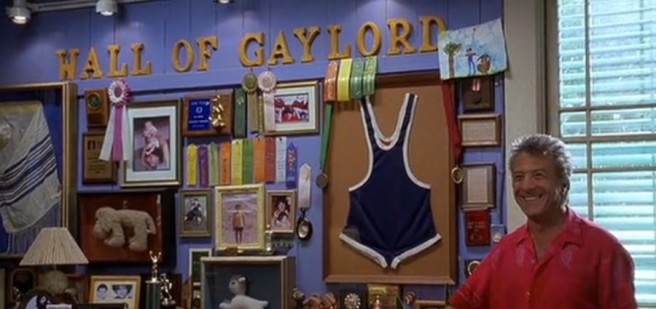
In the not-as-good sequel to “Meet the Parents,” movie-watchers get a glimpse of Gaylord (Gabe) Focker’s upbringing. His parents (Dustin Hoffman and Barbara Streisand) could not be more opposite his in-laws (Robert DeNiro and Blythe Danner). Whereas her parents are tightly wound, prim and proper … always with high expectations for themselves and others … Focker’s parents are emotional and affectionate, eager to heap praise on their son for the most minute achievements.
The best example of the latter comes when we see the Focker Wall of Fame … or the Wall of Gaylord: an astonishingly gaudy display of all Gabe’s accomplishments.
His rather paltry accomplishments.
9th place ribbons (“They’ve got ribbons that go all the way up to 10!”) and a trophy for excellent regional nursing are particularly cited.
Clearly the Focker’s were more concerned about passion than achievement.
Clearly their future in-laws were more concerned about achievement than passion.
In the economy of the United States, the Wall of Gaylord loses every time. In the economy of the gospel, everybody’s wall is the Wall of Gaylord.
Take a look at this astonishing statement from Jesus explaining just how perfect we have to be (Luke 17:1-4).
And he said to his disciples, “Temptations to sin are sure to come, but woe to the one through whom they come! 2 It would be better for him if a millstone were hung around his neck and he were cast into the sea than that he should cause one of these little ones to sin. 3 Pay attention to yourselves! If your brother sins, rebuke him, and if he repents, forgive him, 4 and if he sins against you seven times in the day, and turns to you seven times, saying, ‘I repent,’ you must forgive him.”
You and I are to be so holy that we never cause anyone to sin, always properly call out the sins of others, and always fully forgive every person who sins against us. The disciples instantly recognize that they could never do this, ad cry out to Jesus to “increase their faith” so that they can. Jesus validates their appeal to faith: “If you had faith like a grain of mustard seed, you could say to this mulberry tree, ‘Be uprooted and planted in the sea,’ and it would obey you” (Luke 17:6).
But faith in what? Whatever the answer might be, the next few verses point out that it’s not “faith in our duty.”
7 “Will any one of you who has a servant plowing or keeping sheep say to him when he has come in from the field, ‘Come at once and recline at table’? 8 Will he not rather say to him, ‘Prepare supper for me, and dress properly, and serve me while I eat and drink, and afterward you will eat and drink’? 9 Does he thank the servant because he did what was commanded? 10 So you also, when you have done all that you were commanded, say, ‘We are unworthy servants; we have only done what was our duty.’”
It’s a rather offensive parable to us hard-working southern Americans. As Bryan Chapell has written in his awesome book, “Holiness by Grace,” God does not open his heart and extend his power to his people simply b/c they have done their duty (as if we could even do our duty!).
So what can our faith be in that will move mulberry bushes and grow them in the ocean? What happens next in Luke 17:11-19 illustrates it well. Like a leper who has lost everything he has, we must cry out desperately for the grace and mercy of God.
This is the person God responds to: one who has faith in His grace and mercy and despairs of any other thing to help him. He’s proud of nothing he has done or accomplished.
He knows his wall of accomplishments is a “Wall of Gaylord” at best.
